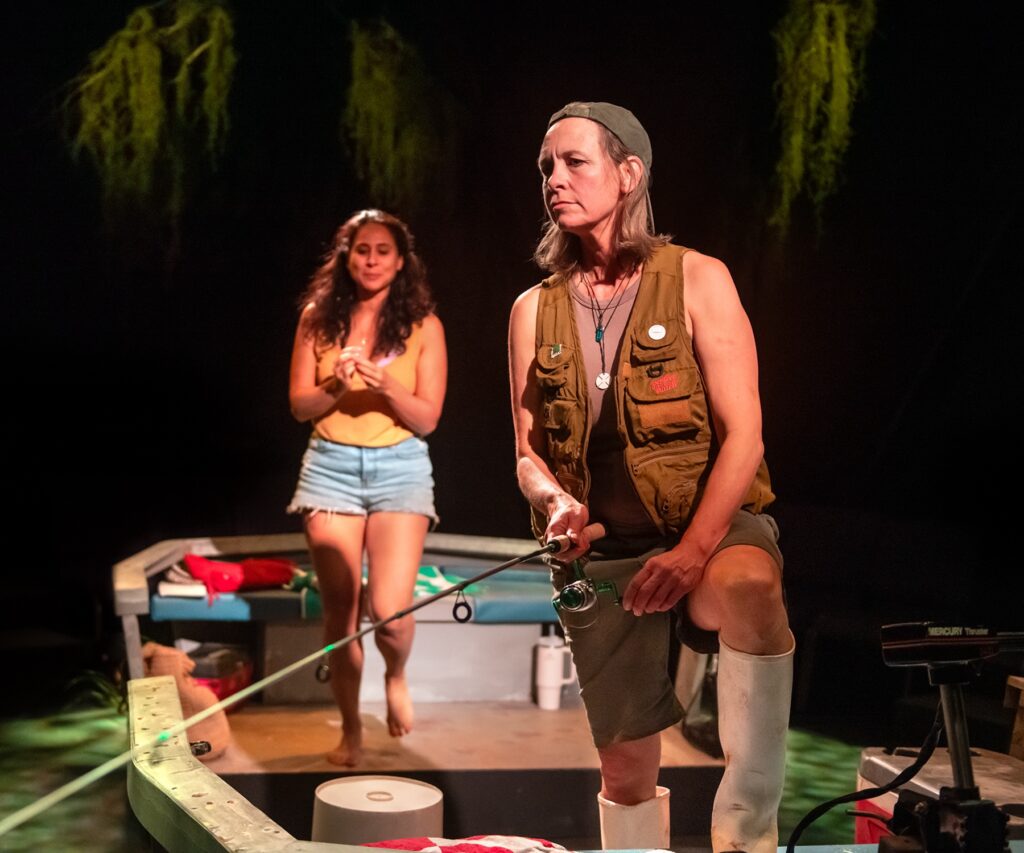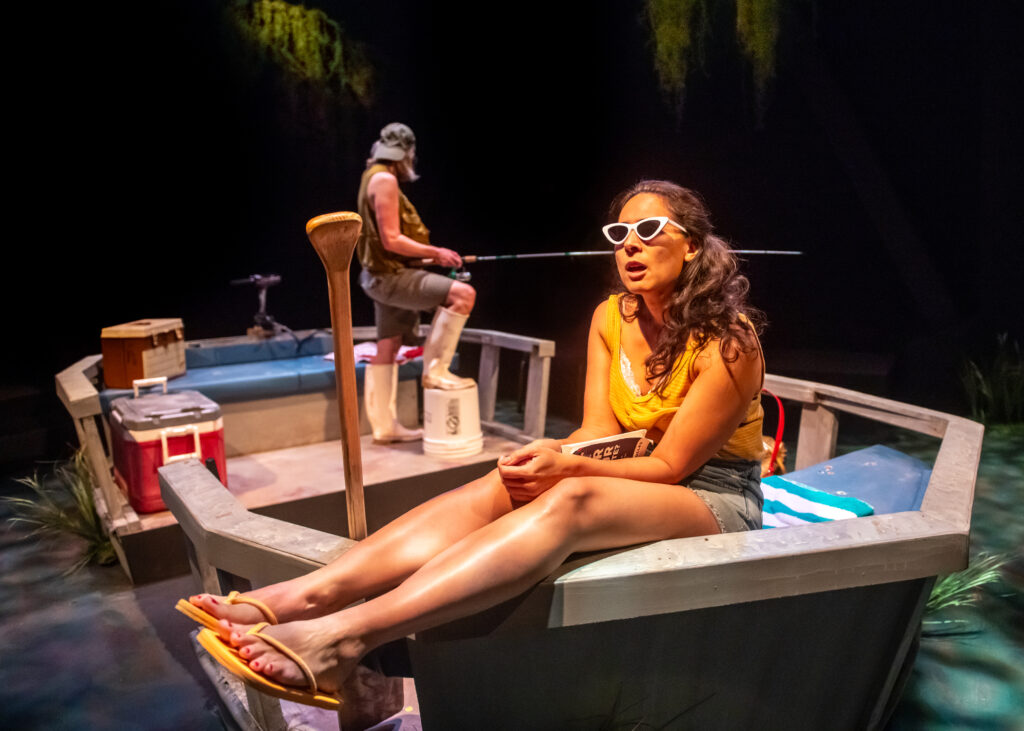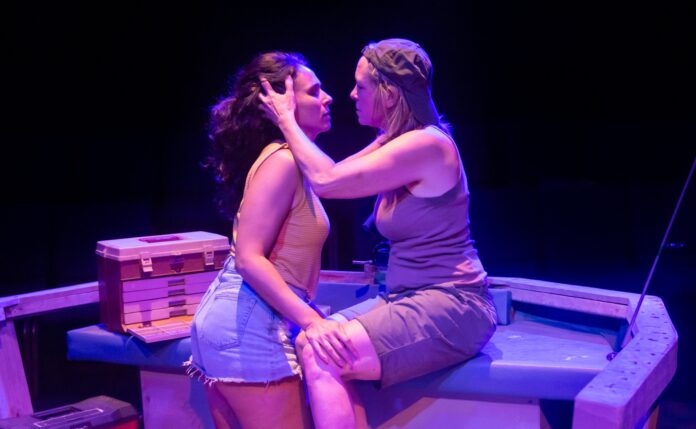As I’ve probably mentioned before, one of the many fascinating aspects about this very much ongoing pandemic is the effect the initial 2020 lockdowns had on romantic relationships. No matter what stage each couple (or throuple, or polycule) was in, suddenly having to deal with romantic partners on a 24/7 basis was a trial for even the most devout lovers. Although some relationships were strengthened, a significant number of people found that they couldn’t stand the sight of their partner after being with them on a ‘round-the-clock basis. (Some took this to horrible extremes.) The pandemic hasn’t ended, but the lockdowns have. And one indisputable lesson everyone learned is that even the strongest bonds require breathing room.
Audrey Cefaly’s 2017 play The Gulf (West Coast premiere through November 24 at New Conservatory, SF) obviously pre-dates the pandemic, but the Satre-esque premise of being stuck with someone is, unsurprisingly, timeless. In fact, the setting very much comes off as a void outside of time or space proper. Staged in NCTC’s smaller Walker Theatre, designer Jenna Forder’s bayou set—with its hanging moss, twinkling lights, and abstract “water” floor—makes it seem as if the bifurcated fishing boat in the center is stuck in the middle of limbo.
That’s certainly the state of our couple’s relationship. We’re in an Alabama swamp to peek at a fishing trip with butch lesbian Kendra (Amy Meyers) and her femme girlfriend Betty (Laura Domingo). Kendra just wants to fish in silence, but Betty’s a chatterbox. She wants to talk about everything, like an obnoxious toddler that wants their parents’ attention at all times. Dim-witted presentation notwithstanding, Betty actually is trying to better herself through a recent junior college enrollment. The only thing better than the thought of making a good living would be if Kendra did the same.

But Kendra has little interest in, if you’ll pardon the pun, rocking the boat. She’s certainly resourceful and possessed of hands-on knowledge (which will become all the more useful as the play goes on), but she prefers to keep everything within arm’s reach. Even Betty finds it hard to get Kendra to open up. As the day goes on and the fish refuse to bite, the two will both let their guard down and reveal things neither wanted the other to know.
A few segments that stand out from Cefaly’s script include an early exchange where Betty (the always-good Laura Domingo) stops rambling and gossiping about a cat-lady neighbor to try and flirt with an uninterested Kendra. “I want you to want me,” Betty implores in all seriousness. “I want you to reach for me.” Later, after a mutual flirtation involving a pocket knife, Betty asks the consistently brave Kendra what she’s afraid of. Her answer is telling: “Clowns. Snakes. You.”
It’s not that she fears Betty as a physical threat—a terrifying later sequence shows that Betty’s the outmatched of the two—but rather the idea that the silver-tongued femme will infect Kendra like a virus and change her irreparably. She accuses Betty of never being satisfied, and Kendra fears that acquiescing to any “improvement” will be giving over control to someone else (who may or may not be entirely faithful). Their passion feels real, but the two come off as a couple that shouldn’t stay together, and that fate is telling them so in not-so-subtle ways. That Betty embraces Kendra and asks “Can we stay like this?” will prove to be one of the script’s cruelest jokes as the sun begins to set.
The above creates a fine revelation of backstory that, thankfully, doesn’t feel especially forced. Along with Forder’s set and props (count the number of beer cans in the boat before the show starts), it’s effective world-building for this slow-burn, Southern-fried story.

Yet, that’s the curious part: being lesbians in a deep red state never comes up. There’s a scene where some unseen neighbors sail by and Kendra exchanges insults with the husband. But it comes off more as redneck shit-talking rather than anything related to queerness. It’s not something that needs to be harped upon, but it’s not even acknowledged once, not even when each character shares a memory of fishing with her respective father. There’s normalizing queer relationships and then there’s ignoring homophobia. Had the play spent a little time exploring how queerness fits into this world—and the couple’s relationship—it would have only benefitted the aforementioned world-building.
Also, there’s a line about Ritz crackers not being canapés that sounded like it was a nod to The Godfather Part II?
Although I chose opening night over the Enhanced Safety Performance (scheduled for Halloween, appropriately enough), I was glad to see that I wasn’t the only person masked in the near-full Walker Theatre. The elder couple beside me wore surgical masks their entire time in the building. The CO² readings on my Aranet4 peaked around 1,254ppm by the final bow.
No matter how passionate they may be, there are just some couples who shouldn’t be together. We’ve all seen them and watch as the once-minor cracks turn into full-fledged fault lines they refuse to acknowledge. That it often takes a major event for them to realize their incompatibility is the second-worst thing after them ignoring the event and staying together. That toxic relationship element is well-captured in Cefaly’s play under Tracy Ward’s assured direction. Betty and Kendra are trapped in a purgatory of their own making with no one but one another to confess to as their relationship reaches its inevitable, unfortunate conclusion.
THE GULF’s West Coast premiere runs through November 24 at New Conservatory, SF. Tickets and further info here.




